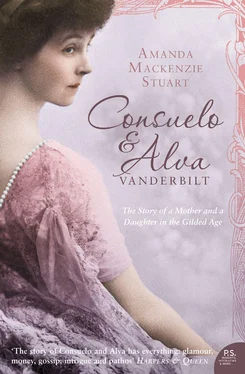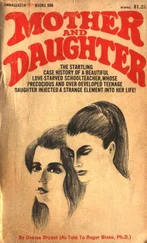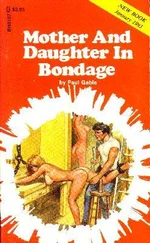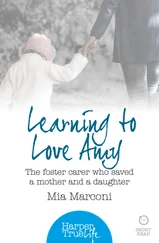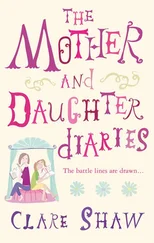In spite of every difficulty being placed in their way, however, Consuelo and Winthrop Rutherfurd eventually met once more at a ball. They had one short dance before Consuelo was taken away by Alva, but he had time to tell Consuelo that his feelings had not changed. That evening, matters came to a head in the most famous mother-daughter row of the Gilded Age. Following an ominous silence on the drive home, Consuelo went to Alva’s bedroom and informed her mother that she felt that she had a right to choose her own husband, and that she intended to marry Winthrop Rutherfurd. ‘These words, the bravest I had ever uttered, brought down a frightful storm of protest. I suffered every searing reproach, heard every possible invective hurled at the man I loved. I was informed of his numerous flirtations, of his well-known love for a married woman, of his desire to marry an heiress.’ 103 Alva went on to declare that there was madness in the Rutherfurd family, and that he could never have children (this was certainly inaccurate). Consuelo, by her own account, stood her ground. Alva argued back that Consuelo was far too young to make the choice herself, and that her ‘decision to select a husband for me was founded on considerations I was too young and inexperienced to appreciate’ 104 – sentiments Alva would later repeat almost word for word herself to Sara Bard Field. 105
Alva had prided herself in bringing up independent-minded children, but when her doll-child finally showed some signs of independence, mother and daughter collided with force. For the first time in her life, Consuelo stood her ground and argued back. ‘I still maintained my right to lead the life I wished. It was perhaps my unexpected resistance or the mere fact that no-one had ever stood up to her that made her say she would not hesitate to shoot a man whom she considered would ruin my life.’ 106 Shouting that she would shoot Winthrop Rutherfurd was characteristic of Alva at her most impulsive, and it would give anyone who knew her a moment’s pause for thought. When Consuelo’s cousin, Adele, indicated she might want to marry her old roué of an uncle, Creighton Webb, her mother Emily – a far kinder and more subtle character – simply replied that she would rather see Adele in her coffin first, and that that was the end of the matter. 107
What followed went far beyond the firm but well-meant line taken with Adele by Aunt Emily. The next day, the house was ominously quiet, and no-one came to see Consuelo. She was told that her mother was ill and that the doctor was on his way. Even her calm and collected English governess seemed harassed. Eventually, her mother’s friend, Lucie Oelrichs, now Mrs William Jay, came to see her. Aunt Jay condemned Consuelo’s behaviour. She may have pointed out that what Consuelo wanted to do was potentially very damaging to Alva. Most seriously, Aunt Jay gave Consuelo to understand that her mother had had a heart attack ‘brought about by my callous indifference to her feelings. She confirmed my mother’s intentions of never consenting to my plans for marriage, and her resolve to shoot X should I decide to run away with him. I asked her if I could see my mother and whether in her opinion she would ever relent. I still remember the terrible answer, “Your mother will never relent and I warn you there will be a catastrophe if you persist. The doctor has said that another scene may easily bring on a heart attack and he will not be responsible for the result. You can ask the doctor yourself if you do not believe me!”.’
The precise details of this scene may have been embellished over time, but much of what Consuelo maintained took place is consistent with Alva’s later behaviour at other times and in different places. Alva’s crude attempt to translate the question of Consuelo’s marriage into one about her own health and happiness is typical behaviour of a highly controlling personality in a very anxious state. Unlike Aunt Emily, Alva was the first to claim that when crossed, her instinct was to head straight for a tremendous fight and an outright win. In this instance she was fighting three battles at once: to stop Consuelo from marrying Winthrop Rutherfurd; to prevent Consuelo from doing anything which might stall the Duke’s visit; and to protect her own social position. Consuelo’s determined reaction may have taken her by surprise. Perhaps her daughter’s unprecedented display of strength of character did indeed make Alva feel so powerless that she fell ill. Who can tell? Whatever the truth, being told that she would kill her mother if she persisted had the desired effect on Consuelo as Alva must have known it would. ‘In utter misery I asked Mrs Jay to let X know that I could not marry him.’ 108
The short period between this terrible row and the Duke’s arrival was marked by a time of intense introspection when Consuelo felt compelled to keep her feelings to herself. She wrote that friends who had been rebuffed no longer called; her brothers meanwhile were too young and too preoccupied with their own affairs. What is perhaps more shocking to the modern sensibility is that no adult intervened. This was because they either shared Alva’s view of Consuelo’s best interests, were too frightened of Alva to protest, or, like Mrs Jay, had a vested interest in the Duke’s arrival in Newport. Remembering the gossip of previous generations, Eileen Slocum remarks that no-one in the wider summer colony could believe that Consuelo would hold out against such an advantageous match for long. It soon became clear that Winthrop Rutherfurd would not be attempting a dramatic elopement. A kind interpretation is that he simply took Consuelo at her word and did not wish to force the issue; a less charitable view is that the prospect of a fight with Alva which might damage a wedding settlement caused him to back off sharply, and he seems to have spent the rest of the Newport season in the background, pottering about on the golf course.
William K. Vanderbilt, meanwhile, was even less help. Even though the Valiant was moored in Newport harbour (and was not ‘away at sea’ as Consuelo thought in her memoirs), he felt out of reach. Consuelo adored her father too much ever to describe him as a weak man but this is the inescapable conclusion: ‘his gentle nature hated strife,’ she wrote. Even while her parents had been married, the children knew it was pointless appealing to him in any struggle with their mother. ‘He played only a small part in our lives … he was always shunted or side-tracked from our occupations … with children’s clairvoyance we knew that she would prove adamant to any appeal our father made on our behalf and we never asked him to interfere.’ 109 The Commodore’s first biographer, who met him, thought William K. showed signs of a ‘morose disposition’, and a rare interview in later life does indeed suggest that however charming and gregarious, William K. also had a melancholic, passive streak. ‘My life was never destined to be quite happy,’ he told the journalist. ‘It was laid along lines which I could not foresee almost from earliest childhood. It has left me with nothing to hope for, with nothing definite to seek or strive for.’ 110 On this occasion, passivity may have led him to fail his daughter.
It is also possible that the idea of Consuelo becoming a duchess appealed to him. Here indeed was the apotheosis of the Vanderbilts; here at last was the final symbol of the family’s rise to the highest echelons of international society; and here was splendid protection from any untoward consequences of his divorce from her mother. In fairness, Consuelo later admitted that she had kept her feelings to herself, and that she knew there was little point in involving her father in a struggle which would ‘only involve him in a hopeless struggle against impossible odds and further stimulate my mother’s rancour’. 111 The log of the Valiant during the Newport season of 1895 suggests that though William K. had no need to protect his social position as Alva did after her divorce, he was equally determined to consolidate it with an on-board entertaining schedule that culminated in a luncheon for the Duke of Marlborough, giving rise to a dark suspicion that he may even have colluded with Alva on this issue.
Читать дальше
